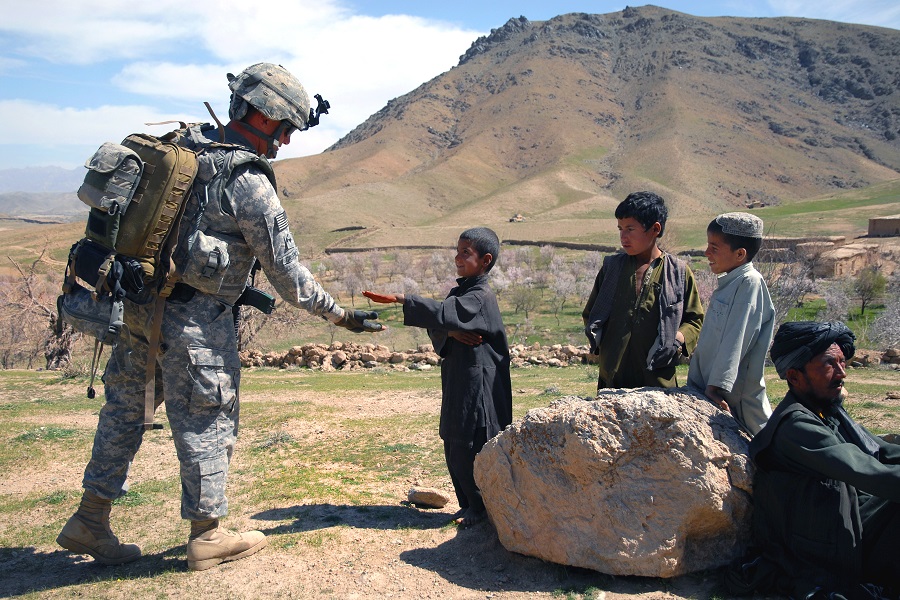Kazakhstan is set to expand an existing railway route that will permit the NATO mission in Afghanistan to ship cargo through Kazakhstani territory.
On Thursday, Kazakhstan’s senate ratified a protocol that will make changes to the agreement signed by NATO and Kazakhstan in 2010. Kazakhstan’s President Nursultan Nazarbayev must approve for the agreement to take effect.
According to the report issued by the Senate on April 19, “The main route for material support of the contingent dispatched in Afghanistan passes through Pakistan, but due to the military and political instability and existing disagreements in bilateral relations, the U.S. side is working on an alternative route.”
Once the agreement is ready, the Kazakhstani seaports of Kuryk and Aktau will be included into the route, and NATO allies will be able to ship cargo to Afghanistan from Azerbaijan to Kazakhstan via the Caspian Sea, and then to land-locked Uzbekistan.
While the proposed route is a modified version of the northern supply line, officials in Astana believe that it will have a positive impact on the development of the transit transport system and the logistics infrastructure of Kazakhstan.
Members of Kazakhstan’s Mazhilis – the country’s lower house of its bicameral parliament - have already ratified the protocol earlier this year. Foreign Minister Kairat Abdrakhmanov said that the agreement is of fundamental importance for his country, primarily because of its humanitarian nature.
“Kazakhstan is ready to render all possible assistance to the forces of the antiterrorist coalition and those countries supporting peace, security and sustainable development in Afghanistan,” Abdrakhmanov said on March 7 following the ratification of the protocol.
According to the Foreign Ministry, “special cargo” shipped to Afghanistan is nothing more than the armored vehicles on wheels without weapons.
At the same time, cargo shipping to Afghanistan is carried out on a commercial basis, as Kazakhstan's government charges the U.S. and its allies for services, work, and goods purchased while shipping goods through its territory. Roman Sklyar, the First Vice-Minister for Investment and Development, highlighted last month that Kazakhstani carriers get their profits from the transit.
“Over the period of the agreement, more than 700 containers were transported – this is about 13,000 tons of cargo,” he said while addressing a meeting in the country’s parliament last month.
“Our carriers received about 200 million tenge (about $620,000) in income from these operations.”
NATO allies provide training, advice, and assistance for the Afghan security forces in their conflict with extremist groups such as the Taliban, the Haqqani network, and ISIS-K within the non-combat Resolute Support Mission (RSM). Launched in 2015, RSM came as a successor of NATO-led International Security Assistance Force (ISAF) and currently comprises around 13,000 personnel from 39 NATO Allies and partners.
Afghanistan is a major concern for Kazakhstan given its close proximity to Kazakhstan’s borders. Astana considers the threats of terrorism and rogue groups operating in Afghanistan and throughout the region a serious threat to its security.
With an aim to stabilize the situation in the neighboring country, Kazakhstan’s government aims to help Afghanistan integrate into the regional economy, political and social life.
In 2010, Kazakhstan launched a $50 million scholarship program for Afghan students. As of 2018, hundreds of students received higher education in areas such as health care, agriculture, engineering and other spheres.
Two years later, officials signed an agreement to promote and protect mutual investments. As of 2016, Kazakhstan has provided humanitarian and technical assistance to Afghanistan in the amount of about $ 20 million.
In addition, while chairing the United Nation Security Council in January 2018, Kazakhstan arranged a visit to Afghanistan. For the first time in seven years, a Security Council delegation visited Afghanistan to observe the situation first-hand from the ground and met with Afghan leadership.







 Russian peacekeeping forces, deployed in the Karabakh (Garabagh) region of Azerbaijan since 2020, have commenced their withdrawal from the area.
Russian peacekeeping forces, deployed in the Karabakh (Garabagh) region of Azerbaijan since 2020, have commenced their withdrawal from the area.
 Azerbaijan officially unveiled the logo for the upcoming 29th session of the Conference of the Parties to the United Nations Framework Convention o...
Azerbaijan officially unveiled the logo for the upcoming 29th session of the Conference of the Parties to the United Nations Framework Convention o...
 Iranian President Ebrahim Raisi warned Israel that it would face a "real and extensive" response if it makes any "mistake" following Tehran’s missi...
Iranian President Ebrahim Raisi warned Israel that it would face a "real and extensive" response if it makes any "mistake" following Tehran’s missi...



